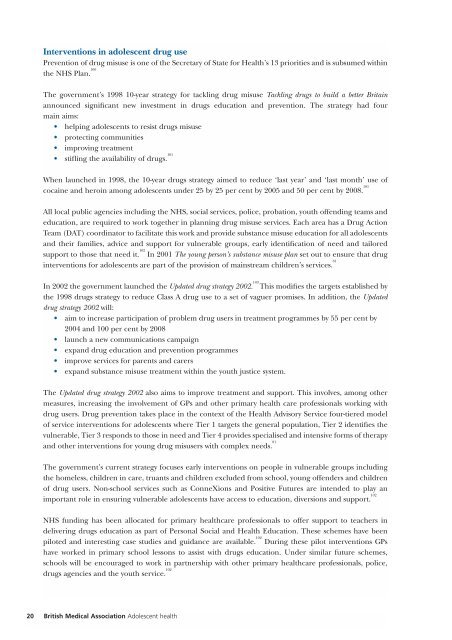Alcohol misuse: tackling the UK epidemic - London
Alcohol misuse: tackling the UK epidemic - London
Alcohol misuse: tackling the UK epidemic - London
You also want an ePaper? Increase the reach of your titles
YUMPU automatically turns print PDFs into web optimized ePapers that Google loves.
20<br />
Interventions in adolescent drug use<br />
Prevention of drug <strong>misuse</strong> is one of <strong>the</strong> Secretary of State for Health’s 13 priorities and is subsumed within<br />
<strong>the</strong> NHS Plan. 100<br />
The government’s 1998 10-year strategy for <strong>tackling</strong> drug <strong>misuse</strong> Tackling drugs to build a better Britain<br />
announced significant new investment in drugs education and prevention. The strategy had four<br />
main aims:<br />
• helping adolescents to resist drugs <strong>misuse</strong><br />
• protecting communities<br />
• improving treatment<br />
• stifling <strong>the</strong> availability of drugs. 101<br />
When launched in 1998, <strong>the</strong> 10-year drugs strategy aimed to reduce ‘last year’ and ‘last month’ use of<br />
cocaine and heroin among adolescents under 25 by 25 per cent by 2005 and 50 per cent by 2008. 101<br />
All local public agencies including <strong>the</strong> NHS, social services, police, probation, youth offending teams and<br />
education, are required to work toge<strong>the</strong>r in planning drug <strong>misuse</strong> services. Each area has a Drug Action<br />
Team (DAT) coordinator to facilitate this work and provide substance <strong>misuse</strong> education for all adolescents<br />
and <strong>the</strong>ir families, advice and support for vulnerable groups, early identification of need and tailored<br />
support to those that need it. 102<br />
In 2001 The young person’s substance <strong>misuse</strong> plan set out to ensure that drug<br />
interventions for adolescents are part of <strong>the</strong> provision of mainstream children’s services. 81<br />
In 2002 <strong>the</strong> government launched <strong>the</strong> Updated drug strategy 2002. 103<br />
This modifies <strong>the</strong> targets established by<br />
<strong>the</strong> 1998 drugs strategy to reduce Class A drug use to a set of vaguer promises. In addition, <strong>the</strong> Updated<br />
drug strategy 2002 will:<br />
• aim to increase participation of problem drug users in treatment programmes by 55 per cent by<br />
2004 and 100 per cent by 2008<br />
• launch a new communications campaign<br />
• expand drug education and prevention programmes<br />
• improve services for parents and carers<br />
• expand substance <strong>misuse</strong> treatment within <strong>the</strong> youth justice system.<br />
The Updated drug strategy 2002 also aims to improve treatment and support. This involves, among o<strong>the</strong>r<br />
measures, increasing <strong>the</strong> involvement of GPs and o<strong>the</strong>r primary health care professionals working with<br />
drug users. Drug prevention takes place in <strong>the</strong> context of <strong>the</strong> Health Advisory Service four-tiered model<br />
of service interventions for adolescents where Tier 1 targets <strong>the</strong> general population, Tier 2 identifies <strong>the</strong><br />
vulnerable, Tier 3 responds to those in need and Tier 4 provides specialised and intensive forms of <strong>the</strong>rapy<br />
and o<strong>the</strong>r interventions for young drug <strong>misuse</strong>rs with complex needs. 81<br />
The government’s current strategy focuses early interventions on people in vulnerable groups including<br />
<strong>the</strong> homeless, children in care, truants and children excluded from school, young offenders and children<br />
of drug users. Non-school services such as ConneXions and Positive Futures are intended to play an<br />
important role in ensuring vulnerable adolescents have access to education, diversions and support. 102<br />
NHS funding has been allocated for primary healthcare professionals to offer support to teachers in<br />
delivering drugs education as part of Personal Social and Health Education. These schemes have been<br />
piloted and interesting case studies and guidance are available. 102<br />
During <strong>the</strong>se pilot interventions GPs<br />
have worked in primary school lessons to assist with drugs education. Under similar future schemes,<br />
schools will be encouraged to work in partnership with o<strong>the</strong>r primary healthcare professionals, police,<br />
drugs agencies and <strong>the</strong> youth service. 102<br />
British Medical Association Adolescent health
















